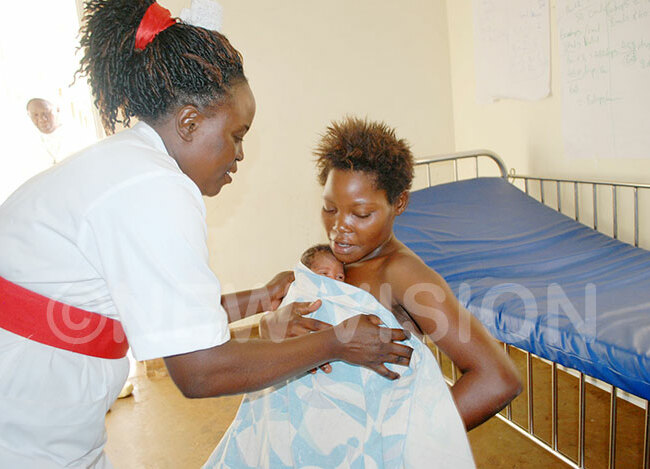Health ministry trains health workers to practice Kangaroo mother care
May 15, 2019
In the effort to curb the high preterm deaths in the country, last week UNICEF partnered with the Ministry of Health to train a total of 19 health workers to support mothers with preterm babies to practice KMC.

NEONATAL HEALTH
KAMPALA - Today is the International Kangaroo Mother Care (KMC) Awareness Day. The day is meant to spread knowledge to enhance the practice. The good news for Uganda is that the Ministry of health has started training health workers on how to help mothers with preterm babies to practice Kangaroo mother care.
In the effort to curb the high preterm deaths in the country, last week UNICEF partnered with the Ministry of Health to train a total of 19 health workers to support mothers with preterm babies to practice KMC.
The regional trainers were drawn from ten health facilities across the country.
Kangaroo mother care also termed as skin to skin contact is a technique of newborn care where babies are kept chest to chest and skin to skin with a parents and most times the mother.
The commissioner for community health at the Ministry of Health, Dr. Jessica Nsungwa said the country lacks a pool of trained health workers to support mothers to do KMC.
"Uganda is currently grappling with high preterm deaths yet KMC is an effective intervention in saving lives for preterm and very small babies," Dr. Nsungwa said.
Data from the Ministry of Health shows that each year, over 200,000 or 14% of Ugandan babies are born prematurely, or before 37 weeks gestation. The same data source reveals that complications of preterm birth are directly responsible for 31% of Uganda's neonatal deaths, and many of the preterm babies who survive face a lifetime of disability.
According to the World Health Organization, Uganda ranks 13th out of 184 countries for the highest number of babies born prematurely and 11th for number deaths due to complications from preterm birth.
Dr. Nsungwa said the training is going to be done in a phased manner.
 Mary Kevin Magoba, the in charge of maternity Kamuli mission hospital helping Susan Katende, 18, to do Kangaroo care. Katende delivered her baby at 28 weeks weighing 1.8 kg
Mary Kevin Magoba, the in charge of maternity Kamuli mission hospital helping Susan Katende, 18, to do Kangaroo care. Katende delivered her baby at 28 weeks weighing 1.8 kg
The regional trainers will, in turn, train health workers in lower facilities, Dr. Nsungwa said.
After, the health ministry will work to ensure that health facilities have KMC corners equipped with beds where mothers can lie. Later, they will disseminate the guidelines and health workers will implement them, she said.
Jane Nabukalu, a midwife/nurse working with Hoima regional referral hospital said the training equipped her with skills to monitor preterm babies on Kangaroo mother care.
"Before the training, I did not mind about monitoring their weight gain and also never bothered to follow them up in the communities after discharge," Nabukalu said.
Benefits of KMC
The director Maternal Adolescent Reproductive and Child Health (MARCH) center London School of Hygiene and Tropical Medicine, Prof. Joy Lawn says when the baby is on the mother's chest during the KMC, the breathing of the mother and especially her heartbeat stimulate the baby. Consequently, this reminds the baby also to breathe.
Prof. Lawn says kangaroo mother care also results in positive effects on brain development.
Additionally, Dr. Harriet Ajilong, a pediatrician working with Gulu regional referral hospital says KMC provides the baby with warmth and creates bonding for both the baby and mother. It is also effective for bigger babies who are stressed.
When to introduce KMC
Dr. Magret Nakakeeto, a consultant neonatologist working with the Ministry of Health says kangaroo mother care is recommended for premature and low birth weight newborn babies of < 200g> who are clinically stable, as per World Health Organization newborn care guidelines.
Dr. Harriet Ajilong, a pediatrician working with Gulu regional referral hospital says kangaroo mother care should be initiated right from the time a mother is attending antenatal care.
Dr. Ajilong says through health education, the concept of KMC should be introduced. Once the mother ends up going into labour before her due date, she should have knowledge on how to do KMC.
Requirements of KMC
According to Dr. Ajilong, KMC is a simple process and cost-effective. All it requires is a clean mother, a room with a bed where she can lie once she is tired of sitting. There should also be a wrap or a lesu (kanga) to securely strap the baby on the chest while she goes about with her domestic chores, she notes.
In addition, it is important to cover the baby's head with a hat or a cap to prevent loss of heat, consequently, keeping the baby warm.
Background of KMC
According to Dr. Nakakeeto who also doubles as the chairperson newborn steering committee at Ministry of Health KMC originated from Bogota in Columbia in South America around 1976.
For Uganda's case, Dr. Nakakeeto started championing the practice in Mulago hospital in 2001 after she attended training in Columbia where she undertook KMC training.
